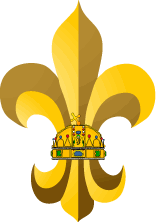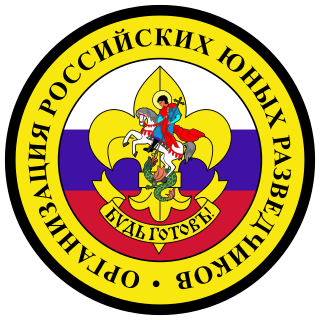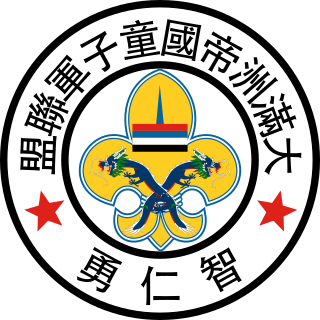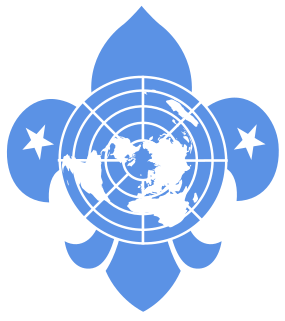
The World Organization of the Scout Movement is the largest international Scouting organization. WOSM has 170 members. These members are recognized national Scout organizations, which collectively have over 50 million participants. WOSM was established in 1922, and has its operational headquarters at Kuala Lumpur, Malaysia and its legal seat in Geneva, Switzerland. It is the counterpart of the World Association of Girl Guides and Girl Scouts (WAGGGS).

The Plast National Scout Organization of Ukraine, commonly called Ukrainian Plast or simply Plast, is the largest Scouting organization in Ukraine.

Scouts-in-Exteris, also referred to as Scouts-in-Exile, are Scouting and Guiding groups formed outside their native country as a result of war and changes in governments. This concept is not to be confused with overseas branches of Scouting associations for Scouts whose parents are stationed in countries due to military or business assignment, such as the Transatlantic Council of the Boy Scouts of America.

The Scout movement in Belarus consists of an unknown number of independent organizations. There are at least five nationwide associations as well as some regional associations. In addition, there were at one time Scouts-in-Exile in metropolitan areas of the United States, and there are presently international Scout units in Belarus.

Dr. Oleksander Tysovsky, pseudonym: "Drot", was the founder of the Ukrainian Scouting organization Plast in 1911, and adapted the universal Scout principles to the needs and interests of Ukrainian youth. In 1944 he emigrated to Vienna. He was involved in Plast in exile, as well, and took part in a camp celebrating the 45th anniversary of Plast in Plastova Sich in Canada in 1957. He died in Vienna 1968 and was buried in Vienna. He was reburied at the famous Lychakivskiy Cemetery in Lviv in 2002.

Külföldi Magyar Cserkészszövetség is a Scouts-in-Exile organization created for youth of Hungarian descent. Scouting makes it possible for the young men and women to learn more about their Hungarian heritage, language and culture. The organization is dedicated to carrying out its obligations at four levels: God, their adopted countries, their fellow man and the Hungarian nation. The Boy Scout and Girl Scout units meet in conjunction with Hungarian weekend schools, which in many instances they also operate.

Colonel Oleg Ivanovich Pantyukhov was the founder of Russian Scouting.

The Organization of Russian Young Pathfinders is one of the two large Russian Scouting in Exile movements. This organization has historically drawn the conservative side of the spectrum of Russians in exile.

The National Organization of Russian Scouts is one of the two large Russian Scouting in Exile movements. This organization has historically drawn the liberal side of the spectrum of Russians in exile. In 2009 NORS celebrated the centenary Jubilee of Russian Scouting.

The National Association of Russian Explorers is a youth organization founded by former Russian Scout Pavel Nikolaevich Bogdanovich, a White emigre and veteran of the Russian Imperial army, in the late 1920s after leaving the National Organization of Russian Scouts of Colonel Oleg Pantyukhov. Also the name National Organisation of Russian Pathfinders was used.

The Scout and Guide movement in the Czech Republic is served by
The Scout and Guide movement in Slovakia is served by
The Scout and Guide movement in Armenia is served by

The Hungarian Scout Association in Romania is the Scouting organization of the Hungarians in Romania. Currently, there are 134 Scout groups, of which 107 are active.

Prince Gustaf Adolf Oscar Fredrik Arthur Edmund, Duke of Västerbotten was a Swedish prince, directly in line of succession to the Swedish throne. He was the eldest son of Gustaf VI Adolf, who ascended the Swedish throne after his son's death. The current king, Carl XVI Gustaf, is Prince Gustaf Adolf's son.

Buckingham Palace Road is a street in Victoria, London. It runs from the south side of Buckingham Palace towards Chelsea, forming the A3214 road and is dominated by Victoria Station.

The Boy Scouts of Manchukuo was a Scouting association of Manchukuo. The Japanese military seized Manchuria in 1931, created the puppet government of Manchukuo in 1932, and controlled it until 1945. The Manchukuo government also set up Japanese-style Scouting in schools, which included para-military training.



















